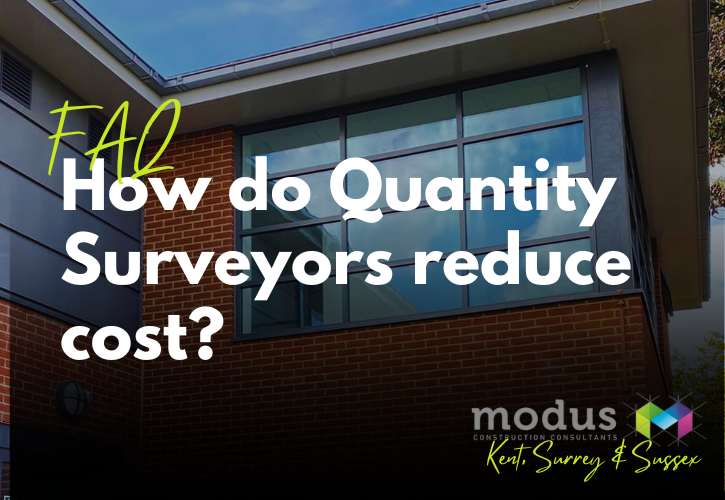How does a Quantity Surveyor control cost?
In our capacity as Quantity Surveyor, Modus are responsible for accurate cost forecasting, effective budget management, cost control and financial reporting and all commercial elements of any project.
Pre-construction
Our initial priority will be to develop a Stage 1 feasibility/viability cost estimate, using gross internal floor areas and published m2 rates to establish a base-line cost for the building, and then inclusion of site-specific works and abnormal costs. The aim of this exercise is to establish a high-level budget to allow the client to test the viability of the scheme.
Being involved in all Design Team meetings will allow us to give advice or any design changes, alternative construction methods and materials or discussions that may occur during the design phase. During this phase, and as designs progress, we will prepare Stage 2 and Stage 3 Cost Plans and update these as necessary.
Throughout the design process, Modus will challenge the Design Team on their design and specification proposals to ensure the Client receives maximum value for their project, whilst maintaining quality. This will include, but not be limited to:
- Feasibility Studies on multiple outline designs
- Options appraisals on various building elements
- Different construction methods
- Alternative products
We would also hold Value Engineering Workshops at various stages of the design to ensure best value for the Client is at the forefront of the design teams mind throughout the process.
The procurement strategy and contract selection can significantly reduce the financial risks associated with the construction phases of the project. There is no form of contract which offers a fully fixed price with no risk of cost increases. However, provided the rest of the contract documentation, design, specification, surveys, reports etc are robustly developed to fully capture the contract requirements, the Design & Build (D&B) form is best suited to achieving this. When acting as Project Manager and Employer’s Agent, we will utilise the project risk register to identify, manage and mitigate the financial risks, and will monitor and advise on the suitability of the tender/contract documentation.
Taking this approach with the design, specification, surveys, reports etc does incur additional upfront fees and costs to the client, however it reduces risks and in the long-term it reduces the overall project costs.
If the tender/contract information is not suitably developed it can impact the project on several fronts; firstly, there will be less appetite to tender the scheme, secondly, the tender will be less competitive as the contractor will allow for increased risk in their price and lastly, it introduces the opportunity for the contractor to claim increased costs in the construction stage.
Assuming that the client is willing to take this approach and incur the fees upfront, we would propose opting for a single-stage competitive tender process, rather than a two-stage negotiated process, as this delivers defined costs earlier, with the highest level of competitiveness and without the additional contractor fees for their input into the design development.
During construction
As Cost Consultant, Modus will attend monthly site meetings to assess the value of works completed in the period so that we can make a recommendation for payment.
Our key responsibility is to ensure that the client is not exposed financially and is not over-paying the contractor for work or activities not completed. We therefore undertake a detailed site review to fully assess the extent of works completed. This coupled with our desktop analysis and assessment of the contract pricing schedule allows us to accurately establish the appropriate percentage of works completed.
Invariably, there will be some variation costs throughout the construction stage, and these will also form part of the valuation process. We will only pay the full value of variation costs that are fully substantiated by the contractor and agreed by us.
Modus employees are traditionally trained surveyors who can accurately measure all aspects of constructions works and have extensive knowledge of the market conditions and rates. As a result, we can undertake our own assessment of any variation costs, which puts us in a strong position to be able to challenge the contractors’ values and negotiate our position to achieve best value for the client.
It is our preference to agree any variations as they arise as this allows us to provide accurate monthly cost reports to update the client on the projected final account. Furthermore, this approach generally reduces potential disputes on completion of the project because the final account is agreed as the works progress.
Additionally, we will:
- prepare monthly cash flow forecasts
- review, and agree, extensions of time
- prepare loss and expense claims
- agree drawdowns with the fund surveyor
- generally advise the client of their financial risks
Sound like an essential service your next construction project could benefit from? Get in contact to discuss your requirements. Our Quantity Surveying service can be coupled with other services such as Contract Administration, Employer’s Agent and Project Co-ordination to provide a more complete offering.






